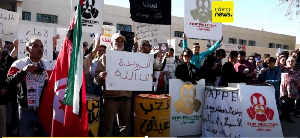Government has announced that the national oil company, Ghana National Petroleum Corporation (GNPC), will in the coming months publish its Public Disclosure Framework to increase access to information.
According to the Deputy Minister of Energy in charge of Petroleum, Mohammed Amin Adam, the move follows efforts by government to improve transparency and accountability in the petroleum industry.
“The government of Ghana recognises that by the nature of Ghana National Oil Corporation’s operations, its commercial relationship with partners and the market involves public interest issues. To this effect, GNPC will soon publish its public disclosure framework to guide the disclosure of key economic and commercial data to improve transparency and advance the cause of public accountability,” he announced.
“This has become necessary because national oil companies are often viewed with suspicion by citizens, and through this GNPC hopes to improve leadership in demystifying this perception.”
He also announced that government will soon publish the General Petroleum Regulations, which will guide access to information to the petroleum industry as a whole.
The deputy minister was speaking at the 3rd African Data Management Workshop opening in Accra, hosted by the Petroleum Commission with support from the Norwegian Petroleum Directorate (NPD).
The workshop, under the theme ‘Embracing a Paradigm Shift in Data Management: An African Synergy Story’, saw representatives from five other African countries which form part of the Oil for Development Programme (OfD) hold discussions around issues on compliance standards, data reporting, resource classification and improving cooperation between member-countries in data management.
Mohammed Amin Adam said: “Africa produces more than 8 million barrels of oil per day, representing about 9% of the world’s total production; and yet the management of petroleum data at the regulatory level – which in effect informs policies, resource evaluation and management of the African oil producing nations – leaves much to be desired.
“This represents a lost opportunity to optimise the returns for citizens and improve resource governance,” he concluded.
Speaking on the Petroleum Commission’s decision to host the workshop, Chief Executive Officer Egbert Faibille said: “It is in the spirit of cordiality and sharing that the Petroleum Commission, without hesitation, welcomed the invitation to host this year’s APDM workshop. We are proud to share the Ghana experience”.
He stated that petroleum data is a national asset which must play a vital role in in shaping policy, and he is therefore optimistic the workshop will go a long way in enhancing Ghana’s petroleum data management.
“We are confident that our engagements here at this workshop will once again advance our cause of promoting, protecting and harnessing our respective national assets – the petroleum data – for the advancement of our respective national economies,” he said.
Business News of Friday, 22 June 2018
Source: thebftonline.com













